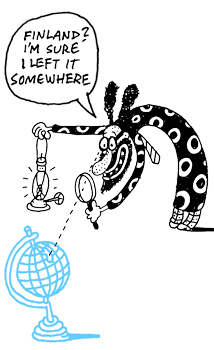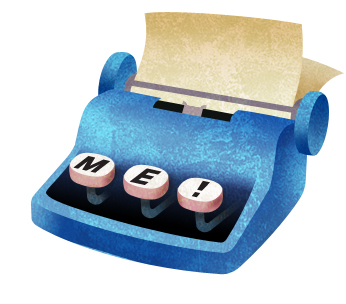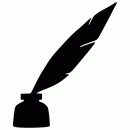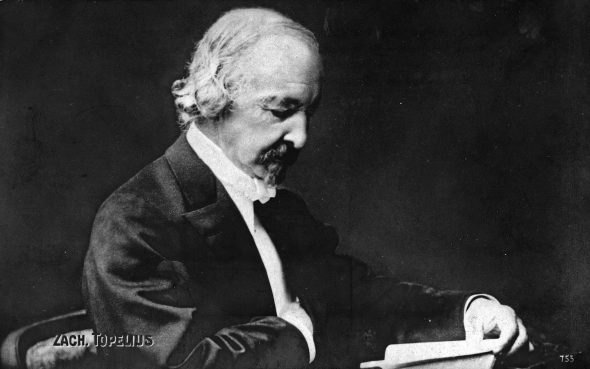Tag: journalism
Not a world language, and yet….
16 January 2015 | Articles, Non-fiction

The editors (Hildi Hawkins and Soila Lehtonen) at the screen: we begun publishing material on our website in 1998. Photo: Jorma Hinkka, 2001
Longevity may not generally be a virtue of literary magazines – they tend to come and go – but Books from Finland, which began publication in 1967, has stuck around for a rather impressively long time. Literary life, as well as the means of production, has changed dramatically in the almost half-century we have been in existence. So where do we stand now? And what does the future look like?
This is the farewell letter from the current Editor-in-Chief, Soila Lehtonen – who began working for the journal in 1983
‘The literature of Finland suffers the handicap of being written in a so-called “minor” language, not a “world” language…. Finland has not entirely been omitted from the world-map of culture, but a more complete and detailed picture of our literature should be made available to those interested in it.’
Thus spake the Finnish Minister of Education, R.H. Oittinen, in early 1967, in the very first little issue of Books from Finland, then published by the Publishers’ Association of Finland, financed by the Education Ministry.
Forty-seven years, almost 10,000 printed pages (1967–2008) and (from 2009) 1,400 website posts later, we might claim that the modest publication entitled Books from Finland, has accomplished the task of creating ‘a more complete and detailed picture’ of Finnish literature for anyone interested in it. More…
Archives open!
12 December 2014 | This 'n' that

Illustration: Hannu Konttinen
For 41 years, from 1967 to 2008, Books from Finland was a printed journal. In 1976, after a decade of existence as not much more than a pamphlet, it began to expand: with more editorial staff and more pages, hundreds of Finnish books and authors were featured in the following decades.
Those texts remain archive treasures.
In 1998 Books from Finland went online, partially: we set up a website of our own, offering a few samples of text from each printed issue. In January 2009 Books from Finland became an online journal in its entirety, now accessible to everyone.
We then decided that we would digitise material from the printed volumes of 1976 to 2008: samples of fiction and related interviews, reviews, and articles should become part of the new website.
The process took a couple of years – thank you, diligent Finnish Literature Exchange (FILI) interns (and Johanna Sillanpää) : Claire Saint-Germain, Bruna di Pastena, Merethe Kristiansen, Franziska Fiebig, Saara Wille and Claire Dickenson! – and now it’s time to start publishing the results. We’re going to do so volume by volume, going backwards.
The first to go online was the fiction published in 2008: among the authors are the poets Tomi Kontio and Rakel Liehu and prose writers Helvi Hämäläinen (1907–1998), Sirpa Kähkönen, Maritta Lintunen, Arne Nevanlinna, Hagar Olsson (1893–1979), Juhani Peltonen (1941–1998) and Mika Waltari (1908–1979).
To introduce these new texts, we will feature a box on our website, entitled New from the archives, where links will take you to the new material. The digitised texts work in the same way as the rest of the posts, using the website’s search engine (although for technical reasons we have been unable to include all the original pictures).
![]()
By the time we reach the year 1976, there will be texts by more than 400 fiction authors on our website. We are proud and delighted that the printed treasures of past decades – the best of the Finnish literature published over the period – will be available to all readers of Books from Finland.
The small world of Finnish fiction will be even more accessible to the great English-speaking universe. Read on!
Journalist 3.0
22 May 2014 | Non-fiction, Tales of a journalist

Illustration: Joonas Väänänen
As the world becomes more and more difficult to understand, the media, strapped for cash and forced for reduce expenses, sack their expert writers. Jyrki Lehtola assesses the new breed of cut-price journalists
Some time in the distant past it was possible for a reader to reflect that here was an educated journalist writing pithily. It would be nice to know more of his or her thoughts.
There used to be talk of such concepts as the ‘objective truth’, and editors shunned talking about themselves, or even speaking or writing in the first person. There was just the world, which the journalist, the conduit of truth, conveyed to the public.
Now, although most of us would prefer to know nothing about journalists and their private lives, journalists have brought their lives strongly into the public arena. Objectivity is dead; there are merely millions of subjects who perhaps share the same experiences, perhaps not, and, misled by some idealised concept of community, we are the beneficiaries of journalists writing about what it’s like to be a mum, how challenging life as a mother and journalist can be. More…
The human factor
14 March 2013 | Non-fiction, Tales of a journalist

Illustration: Joonas väänänen
Columnist Jyrki Lehtola zooms in on the worst factor in the diminishing quality journalism: us. Our voice is now dominant in the media, and it isn’t a particularly pleasant one.
Have you heard the rumours about the crisis in the media yet? Or their search for a new revenue logic that consists of repeating the words ‘Internet’ and ‘money’? I’m sure you have, even though the media itself claims to be getting along fairly well and can always find some perspective on its dropping circulation numbers that tells everyone they’re doing just fine. (For example, their numbers are better than in 1898 when the paper didn’t exist. Yes, we rule!)
But that isn’t the only problem. The other problem exists in us, the readers, listeners and viewers. Social media, discussion boards, and the media itself have given us a voice, and, er, well, it isn’t the kind of voice anyone wants to hear.
It turned out we have an ugly voice, and we want all the wrong things. More…
What the critic said
9 July 2010 | Letter from the Editors

Illustration by Joan Barrás
‘Pay no attention to what the critics say. A statue has never been erected in honour of a critic,’ said the Finnish composer Jean Sibelius.
No, probably not; but people still read what the critics write – and, sometimes, also what they wrote fifty or a hundred years ago.
An annual list of professions most highly valued by the public in Finland is always headed by surgeons. Shepherds generally feature at the bottom of the list. But critics fare none too well, either – a couple of years ago they were ranked between butchers and gravediggers. Which, of course, can be interpreted, in metaphorical terms, either as hilarious or tragicomical. More…

